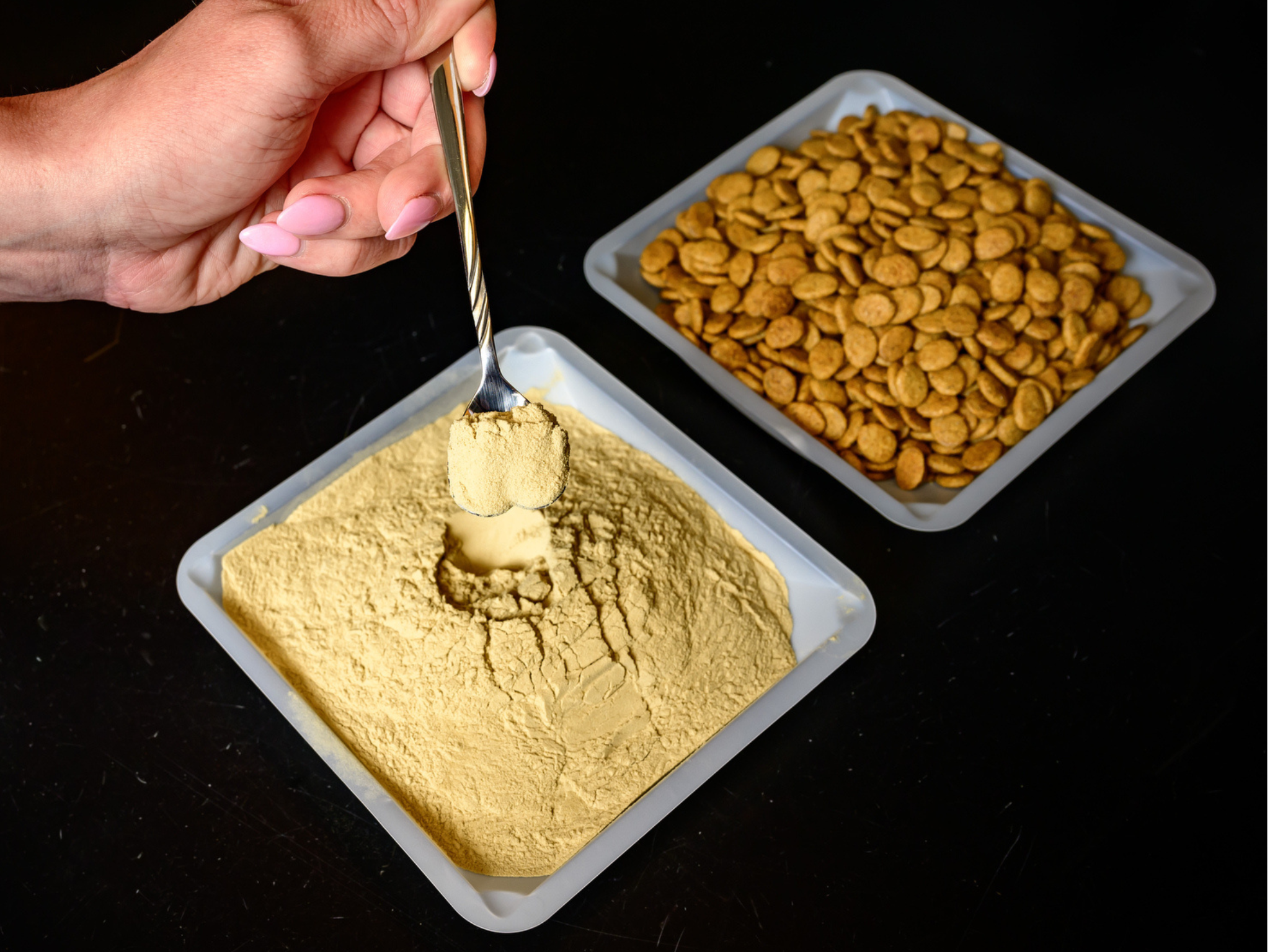
Recombinant chicken proteins brewed through precision fermentation provide a multitude of health benefits for dogs, a new study has found.
Precision fermentation can unlock a range of health benefits in pet food for dogs, a first-of-a-kind study has revealed.
Scientists at the University of Illinois Urbana-Champaign and Colorado-based startup Bond Pet Foods teamed up to produce a recombinant chicken protein in yeast via precision fermentation. The technology involves inserting DNA into microbes to teach them to produce specific molecules after fermentation.
Dogs that consumed the resulting protein in their kibble over the six-month study were found to have a beneficial impact on digestion, the intestine and gut microbiome, and faecal metabolites.
“The main goal was to provide foundational protein for pet health, but it looks like there could be a secondary benefit from the soluble, fermentable fibres in the whole cell product for the dogs’ large intestines as well,” said Tomas Belloso, VP of regulatory affairs at Bond Pet Foods, and co-author of the study published in the Frontiers in Veterinary Science journal.
How Bond Pet Foods makes precision-fermented chicken protein

Founded in 2017, Bond Pet Foods has raised $20M in total funding, and specialises in precision-fermented meats like chicken, turkey and beef for pet food applications. It harvests these proteins to better meet the nutritional requirements of pets, and supplies the ingredients to manufacturers for pet food, treat and supplement applications.
For the study, its R&D team identified proteins that were highly abundant in the muscle tissue of chickens, and then cross-referenced them to their DNA sequence. The DNA was then inserted into a specific site in the genome of brewers’ yeast to express the chicken protein, which was fermented in large tanks similar to those used in breweries.
After the culture medium was removed, the biomass was harvested, heat-treated and spray-dried to produce the yeast-containing chicken protein, which was formulated into kibble.
Brewers’ yeast is a rich source of protein and also provides complex B vitamins, amino acids and minerals. And previous research by Kelly Swanson, director of the university’s nutritional sciences division and co-author of this study, has found that yeast products can help elevate concentrations of beneficial faecal bacteria and intestinal antibodies that boost immunity by neutralising pathogens.
In this research, Swanson, Bellaso and colleagues tested the brewed chicken protein in 32 healthy adult dogs. During the two-week acclimation phase, all dogs ate a control diet based on chicken byproduct meal and brewers’ rice. They were then divided into four dietary groups, three of which were assigned to eat a diet containing 15%, 30% and 40% brewed chicken protein.
All the dogs’ diets contained similar levels of organic matter, ash, crude protein, and fat. And they were fed amounts intended to maintain their body weight to avoid any potential physiological effects linked to weight gain.
The researchers analysed blood, faecal and urine samples, as well as food intake, weight and overall condition, at four and 26 weeks, and saw no statistical differences between the four groups. All factors remained in healthy ranges, with no detrimental effects – like allergic reactions or adverse blood chemistry changes – found.
Brewed chicken protein offers digestibility and gut health benefits

While including brewed chicken protein in dogs’ diets somewhat decreased the digestibility of fats, they remained highly digestible overall. Likewise, the amount of faeces and faecal dry matter in the three treatment groups decreased with greater intake of the precision-fermented kibble, but the dogs’ faeces were still “soft, formed, and moist, and of acceptable quality”.
“When we were formulating these diets, we knew there was a lot of soluble fibre in them, and that was one thing I was a little nervous about — if it would cause loose stools or constipation, which is not a nice outcome for pets or their owners. And I was happy to see that the stool quality was not affected,” explained Swanson.
“[The kibble] was highly digestible and there were some beneficial changes to the dogs’ gut microbes and metabolites,” she added.
Notably, faecal concentrations of short-chain amino acids like butyrate, propionate and valerate, which are linked to reduced inflammation and other beneficial effects, rose with higher intake of the fermentation-derived protein.
“We’re thrilled to see such positive results from the University of Illinois study. It reinforces the promise of brewed chicken protein as a safe, effective and sustainable option for pet nutrition,” said Belloso.
Alongside the brewed chicken protein, Bond Pet Foods is developing a separate precision-fermented ingredient for Hill’s Pet Food, a subsidiary of Colgate-Palmolive. It has so far produced 10 tonnes of protein for evaluation by its partners as well as the US Food and Drug Administration, whose Center for Veterinary Medicine oversees novel pet food regulation in the country.
Interest in low-carbon pet food has risen as awareness about the health and climate impact of animal proteins and byproducts rises. In the last year, the UK became the first country where consumers could buy cultivated meat for their cats and dogs off the shelves, while Germany’s Marsapet rolled out a kibble product for dogs using Calysta’s gas-fermented FeedKind protein in Europe.
Elsewhere, one US startup has conducted feeding trials in pursuit of regulatory approval in the US, and California’s Friends & Family Pet Food Co has received regulatory approval for cultivated chicken in Singapore, a first for Asia.
The post Precision-Fermented Chicken Adds Digestive & Gut Health Benefits to Dog Food: Study appeared first on Green Queen.
This post was originally published on Green Queen.